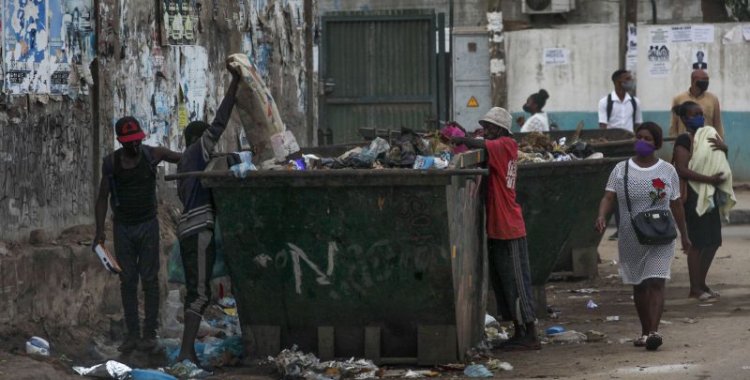Many of the children find on the street an alternative to family poverty. They come from Luanda's peripheral neighborhoods, of precarious and disordered construction, with little transportation and scarcity of schools and health care, without sanitation or water, where the families survive on the income they can generate on a daily basis with small sales.
Contrary to what is seen in the city, here the mask is dispensed, although everyone has heard about covid-19.
You can't take much from those who already have nothing and between hunger, malaria and diarrhea, a new coronavirus is just another problem.
Rufina is the mother of four children, among them Agostinho Cateque 'Pinocchio', a boy who walked the streets and is now returning to his mother's home with the help of the teams of the Don Bosco Salesian organization that accompany children at risk.
Malaria, the main cause of death in Angola, has left marks on two of his children and the oldest is visible brain damage.
Rufina has no great explanation for the departure of 'Pinocchio' from the motherhouse. She says that the young man, now 16, did not like the behavior in the neighborhood and was persecuted by others.
They live in a basic structure of cement blocks, which was once made of sheet metal, with practically no furniture.
The mother sells sleeves to do some business. When the money arrives they make a "matabicho" with bread, when there is no bread, they fast until the afternoon funge (a dish made with corn or manioc flour, typical of Angolan gastronomy) is prepared.
In Augustine's room, a wall with the inscription 'Pinocchio' identifies its legitimate owner. It has a mattress on the floor, a desk and all the legitimate ambitions of youth. Among them, that of being President of the Republic.
Pinocchio' says that he went to the streets at the age of 10 because of his disagreements with his mother.
"He was very disobedient, he liked to move, he took money and went to play 'playstation' in the 'cyber'," he says.
The first day on the street he walked alone and ended up in the bay of Luanda. But as he was "very embarrassing, he didn't like to ask," he recalled, someone offered him food and joined his new friend, Adilson.
"We started fighting together," he recalls. During the day, he would get change to fix cars and, in the meantime, he entered a foster home where he received professional training and advanced his studies.
Recently returned to his family due to the pandemic, he says he didn't adapt well, at first, to life in the home.
"I really liked to discuss some traumas, but with the help of the educators I got better. I started to be a good boy and also to give advice to others, I showed that I can also teach others and that being angry is not a good thing, that we should be calm", he highlights.
He learned electricity and computer science, but covid-19 has meanwhile stopped the completion of training and the award of the certificate.
But Pinocchio says you won't give up: "When I was little I always dreamed of being President of the Republic of Angola and I want to continue dreaming. I want to go straight ahead and be President or Representative, at least be someone in politics to improve what is wrong".
And what would change? "The corruption, the disagreement, the discrimination. There are several families in need, and the presidents are always lying to people, they say they're going to help and they don't help," he laments.
For Fernando João Mendes, 22, the street was an alternative to the bad tracts he suffered at home.
He lived in the Rangel district, in Luanda, with his parents and five brothers, but because of his father's "mental disorder," "there was a lot of domestic violence," which led him to spend more time on the street.
By the age of 10, he was already walking around the Congolese market trying to make some money. He arrived around 8 a.m., swept the garbage and helped the vendors organize the selling places. The money was used for food and playing PlayStation.
It was there that he met some friends who already knew the Don Bosco Salesian organization and told him about the good living conditions of the centers. He joined Casa Magone in 2010 at the age of 12 and his parents, at first reticent, were convinced of the advantages of formation.
There he ended up doing some professional courses: carpentry, carpentry, agriculture, computer science and electricity, an area he embarked on and which allowed him to employ himself and gain autonomy.
"This is where I had the opportunity to have a job," he says, smiling.
Fernando lives with his brother, who works in the pastry industry, in a rented house on the outskirts of Luanda and has been working for two and a half years in a company where he provides maintenance, electricity and air conditioning services.
His father passed away, but whenever he can he continues visiting his mother and brothers.
Fernando dreamed of being a great soccer player, but now he just wants to finish the accounting training he started recently and be "a great accountant".







